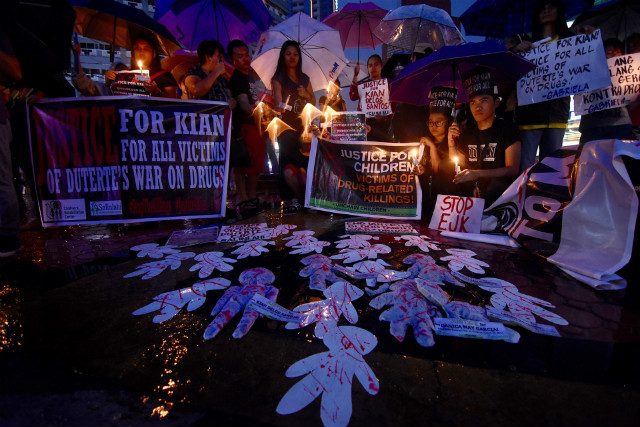SUMMARY
This is AI generated summarization, which may have errors. For context, always refer to the full article.

MANILA, Philippines (UPDATED) – President Rodrigo Duterte’s “overarching focus” on countering “real and inflated” national security threats has resulted in grave human rights violations, a United Nations report found.
In its report released on Thursday, June 4, the UN Office of the High Commissioner for Human Rights (UN OHCHR) said that this focus “has permeated the implementation of existing laws and policies and the adoption of new measures – often at the expense of human rights, due process rights, the rule of law, and accountability.”
“Thus, while there have been important human rights gains in recent years, particularly in economic and social rights, the underpinning focus on national security threats – real and inflated – has led to serious human rights violations, reinforced by harmful rhetoric from high-level officials,” the report said. ()
“In recent years, harmful rhetoric from the highest levels of the Government has been pervasive and deeply damaging. Some statements have risen to the level of incitement to violence,” it added.
Duterte’s violent war on drugs led to the death of at least 6,000 suspected drug personalities in police operations. Human rights groups pegged the number to reach more than 20,000 to include those killed vigilante-style. (READ: The Impunity Series)
The report also said that there is little to no accountability over the killings, noting the lack of progress in cases filed before the Office of the Ombudsman.
“Despite credible allegations of widespread and systematic extrajudicial killings in the context of the campaign against illegal drugs, there has been near impunity for such violations,” it said. “The OHCHR also notes that administrative sanctions are insufficient where there are serious allegations of violations of the right to life.”
Shrinking civic space noted
Aside from the drug war killings, the UN report also highlighted the massive threats against progressive groups, activists, and journalists as the Duterte government stepped up its the anti-communist campaign.
It documented that between 2015 and 2019, at least 248 human rights defenders, legal professionals, journalists and trade unionists have been killed in relation to their work.
The report said human rights defenders were often villified to the point that it is “routinely equated with insurgency and the focus diverted to discrediting the messengers rather than examining the substance of the message.”
“This has muddied the space for debate, disagreement, and for challenging State institutions and policies, resulting in deep mistrust between government and civil society – a rift that urgently needs to be repaired,” the report said.
Need independent investigation
Because of the lack of accountability through domestic mechanisms, the UN human rights office stressed the need for “independent, impartial, credible investigations” into the violations, and that there should be a system to “compile and publish consistent, disaggregated data on all allegations of extrajudicial killings.”
The UN also urged the Philippine National Police to cease the deadly anti-drug operations and put an end to extrajudicial killings, arbitrary detentions, and other violence against suspected drug personalities.
It also called on authorities to abolish the lists and cease the publication of drug watch lists.
The report followed a resolution adopted by the UN Human Rights Council in July 2019, which asked UN rights chief Michelle Bachelet to write and present the report to the UNHRC 44th Session this June.
Bachelet previously called out the killings in the Philippines. In speeches delivered before the UNHRC, she said that Duterte’s drug war is not a model for any country and that the killings are a “most serious concern.”
The International Criminal Court’s Office of the Prosecutor, meanwhile, is currently conducting a “preliminary examination” into killings, with ICC Prosecutor Fatou Bensouda saying that the next step can be expected by 2020.
The Duterte government has consistently opposed and blocked any form of international mechanism for investigation. The President withdrew the Philippines from the International Criminal Court and hurled insults to countries, groups, and personalities who have expressed condemnation of the human rights situation in the Philippines under his watch. – Rappler.com
Read more stories on the UN report:
- DOCUMENT: U.N. Human Rights report on killings, abuses in PH
- Duterte’s focus on ‘real and inflated’ security threats leads to serious rights violations – U.N. report
- Abuses, killings in PH possibly incited by Duterte’s violent rhetoric – U.N. report
- U.N. report: Documents suggest PH police planted guns in drug war ops
- U.N. report: PH local system not enough to exact accountability for killings
- U.N. report raises concern over ‘problematic’ PH anti-terror bill
Add a comment
How does this make you feel?
There are no comments yet. Add your comment to start the conversation.